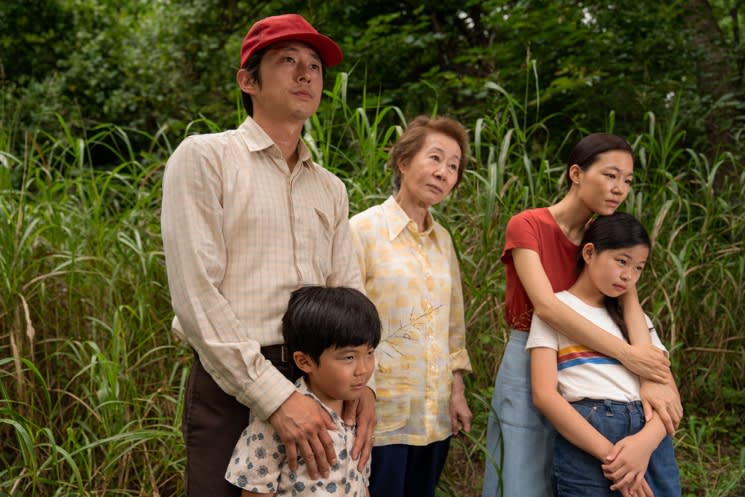It's rare to be fully invested in a film from its first minute, but Lee Issac Chung's Minari makes you fall in love with the Yi family instantly. Based on Chung's childhood, Minari is a tender and precise take on the immigrant experience.
Set in the 1980s, Jacob (Steven Yeun) and Monica Yi (Han Ye-ri) have just moved their family from California to a rural farm area in Arkansas with their two children, Anne (Noel Kate Cho) and David (Alan Kim). They're in search of a fresh start — but it doesn't come without a price. Monica is fixated on a stable future, but Jacob dreams of building his own garden on the farm. David also has a heart murmur which prevents him from doing simple things comfortably, like running. The Yis' new lifestyle is thrown for a whirl with Monica's youthful mother, Soonja (Youn Yuh-jung), comes from Korea to live with them.
Minari treats the Yis' Asian-American identity with softness — the Yis mainly speak in their mother tongue, and Jacob prioritizes growing and selling Korean produce in his garden. The harsh realities of their experience aren't explicit — apart from naïve (but still racist) comments directed at Anne and David from their white peers, or when David says his grandmother "smells Korean." Yet, it's clear the challenges they face in the film are deeply rooted in race and who has the privilege to flourish in America.
Early on, the film's namesake comes into focus. Minari is a plant akin to a weed, and it grows anywhere. This sentiment is representative of the main theme of the film: immigrant determination. Minari treats this issue with care and details how the Yis have the strength to get through their struggle, regardless of their circumstances. This idea is relatable for many racialized immigrant families, and although the film takes place in the '80s, it's still a facet of the modern immigrant experience.
While Jacob's dream dominates the family, the Yis are in a haze of uncertainty, and problems slowly emerge. The relationship between Jacob and Monica is rocky throughout the film, but they share an emotional moment which solidifies how alive the garden makes Jacob feel — he's chasing success, but in an unconventional way. Yeun's performance is timid but sharp, proving he could be an underdog to watch in the upcoming awards season. Scenes like this are juxtaposed with dreamy cinematography that evokes a sense of calmness.
There's a lot to love about Minari, including Emile Mosseri's score, which is perfect from the first note in the opening scene. It's luscious, and mainly features piano and soft strings which effortlessly meld into each scene, becoming one with the visuals.
Minari challenges the idea of the American dream, as the Yis learn to enjoy the small victories in life. The film feels specific in many moments, but it's the specificity of resilience and unity that makes it feel universal.
Minari will be available on VOD starting February 26.
(Elevation Pictures)Set in the 1980s, Jacob (Steven Yeun) and Monica Yi (Han Ye-ri) have just moved their family from California to a rural farm area in Arkansas with their two children, Anne (Noel Kate Cho) and David (Alan Kim). They're in search of a fresh start — but it doesn't come without a price. Monica is fixated on a stable future, but Jacob dreams of building his own garden on the farm. David also has a heart murmur which prevents him from doing simple things comfortably, like running. The Yis' new lifestyle is thrown for a whirl with Monica's youthful mother, Soonja (Youn Yuh-jung), comes from Korea to live with them.
Minari treats the Yis' Asian-American identity with softness — the Yis mainly speak in their mother tongue, and Jacob prioritizes growing and selling Korean produce in his garden. The harsh realities of their experience aren't explicit — apart from naïve (but still racist) comments directed at Anne and David from their white peers, or when David says his grandmother "smells Korean." Yet, it's clear the challenges they face in the film are deeply rooted in race and who has the privilege to flourish in America.
Early on, the film's namesake comes into focus. Minari is a plant akin to a weed, and it grows anywhere. This sentiment is representative of the main theme of the film: immigrant determination. Minari treats this issue with care and details how the Yis have the strength to get through their struggle, regardless of their circumstances. This idea is relatable for many racialized immigrant families, and although the film takes place in the '80s, it's still a facet of the modern immigrant experience.
While Jacob's dream dominates the family, the Yis are in a haze of uncertainty, and problems slowly emerge. The relationship between Jacob and Monica is rocky throughout the film, but they share an emotional moment which solidifies how alive the garden makes Jacob feel — he's chasing success, but in an unconventional way. Yeun's performance is timid but sharp, proving he could be an underdog to watch in the upcoming awards season. Scenes like this are juxtaposed with dreamy cinematography that evokes a sense of calmness.
There's a lot to love about Minari, including Emile Mosseri's score, which is perfect from the first note in the opening scene. It's luscious, and mainly features piano and soft strings which effortlessly meld into each scene, becoming one with the visuals.
Minari challenges the idea of the American dream, as the Yis learn to enjoy the small victories in life. The film feels specific in many moments, but it's the specificity of resilience and unity that makes it feel universal.
Minari will be available on VOD starting February 26.
